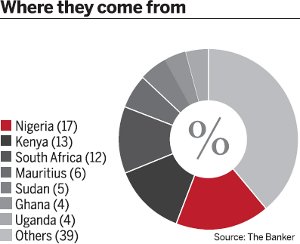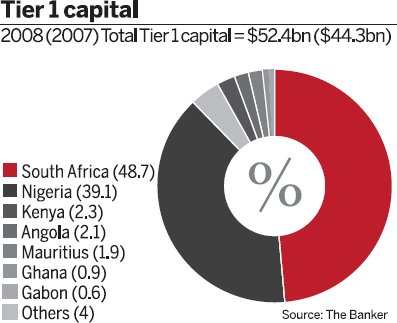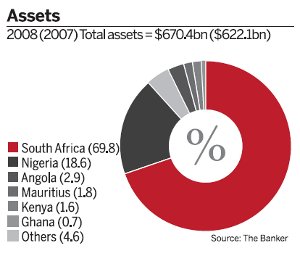Rankings show calm before Nigerian storm
The Banker's Top 100 African Banks ranking shows Nigerian banks chipping away at the dominance of their South African counterparts, a situation that will look very different once the recent bailouts in the west African country are taken into account. Writer Charlie Corbett
The actions of Lamido Sanusi, the governor of the Central Bank of Nigeria, have dominated the headlines for African banking over the past three months. In October this year, Mr Sanusi took unprecedented steps to shore up Nigeria's beleaguered bank sector that had been hit by a wave of bad debts.
In just under two months, nine out of Nigeria's 24 commercial banks were bailed out to the tune of $4bn and seven of their chief executives were dismissed. The chief executives of Afribank, Finbank, Intercontinental Bank, Oceanic Bank, Union Bank, Bank PHB and Equatorial Trust Bank were removed, while Wema Bank and Unity Bank retained their management, but received a capital injection.
Changing picture
After five years of stellar growth, Nigeria's banking sector has been forced to take some bitter medicine. The dust has yet to settle and it must be born in mind that this year's rankings do not reflect how things stand at the moment in Nigeria. Due to the nature of financial reporting in Nigeria, where results are published throughout the year rather than collectively by all the banks at the end of the year, it is hard to gain a balanced snapshot of the situation.
Not all of Nigeria's banks were targeted by Mr Sanusi and many of them continue to grow steadily and make inroads on South Africa's dominance of the rankings. In particular, Zenith Bank and First Bank of Nigeria have shown strong growth in the face of severe economic headwinds. Zenith Bank leapfrogged South Africa's Investec in this year's rankings, making it into the top five of Africa's biggest banks by Tier 1 capital.
First Bank of Nigeria has also proved itself to be resilient to the financial crisis. It too leapfrogged Investec, and moved from 14th place in the rankings last year to sixth place this year. According to this year's rankings, Investec is now the seventh biggest bank in Africa by Tier 1 capital, down from fifth place last year. Standard Bank is once more top of the Tier 1 capital league in Africa, but First Rand Banking Group is hot on its heels in second place. First Rand increased its Tier 1 capital by 21.9% to $6.3bn in the year to December 2008, while Standard Bank's Tier 1 capital dropped 9.2% to $7.3bn.
In terms of total assets in Africa, South Africa's share of the pie fell from just over 75% for the year to December 2007, down to just under 70% for the year to December 2008. Nigeria's share of the pie, however, continued to increase. Nigerian banks' share of total assets in Africa rose from 13.5% in last year's rankings to 18.6% in this year's rankings. Angola's banks have also made steady progress. Their share of total African assets increased from just 1% for year-end 2007 to nearly 3% for year-end 2008.
Note: Subsequent to The Banker receiving these figures, the Central Bank of Nigeria embarked upon a $4bn recapitalisation process that saw the chief executives of Afribank, Finbank, Intercontinental Bank, Oceanic Bank, Union Bank, Bank PHB and Equitorial Trust Bank being removed. Wema Bank and Unity Bank retained their management, but received a capital injection.





